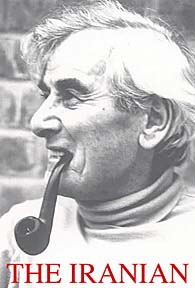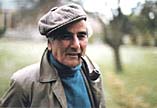Cover story

Eprime
In fond memory of Eprime Eshag; friend, economist (1918-1998)
By Ebrahim Golestan
December 21, 1998
The Iranian
The following was read at last month's cremation ceremony for Eprime
Eshag:
In a short while the body of Eprime will return to the purity of basic
elements. The memory of what he was will remain with some of us. Our memory
of him is the essence of his existence as reflected in the polished, or
tarnished, mirror of our mind.
The image that I have of him is of bold sincerity. He was nothing if
not sincere. The sincerity was always critical. He was nothing if not critical.
The alert analysis that he would make of problems and people, and his almost
immediate evaluation of events and situations was, most of the time, judged
as abrasive and authoritarian -- by a lethargic and convention-bound mundane
majority.
He was a lone individual armed with moral conviction He had his hang-ups
but the hang-ups were part of the force that was driving him, that was
making his expression bold, his feeling intense and protected and
controlled his sincerity, because they were the fruits of his convictions.
 I never saw him lying; I never saw him greedy; I never
saw him making concessions to the unjust, or to what he would consider
wrong.Relatives and friends and opponents were treated with the same intransigence,
the same rectitude. He was a purely political person whom, because of what
he was and how he was, could not be accommodated within any available organisational
or systematic political discipline. This was another part of his forceful
personality. It only enhanced and underlined his moral independence.
I never saw him lying; I never saw him greedy; I never
saw him making concessions to the unjust, or to what he would consider
wrong.Relatives and friends and opponents were treated with the same intransigence,
the same rectitude. He was a purely political person whom, because of what
he was and how he was, could not be accommodated within any available organisational
or systematic political discipline. This was another part of his forceful
personality. It only enhanced and underlined his moral independence.
I met him 53 years ago. He had just returned from a decade-long stay
in London in the turbulent years from the mid-30's until the gneral elections
of 1945. In his teens he had been sent to England on a scholarship by the
National Bank of Iran to become a chartered accountant.
He was from an Assyrian family; his father a preacher of no great material
means. Eprime's apprenticeship made swift progress but the war years had
made it impossible for him to return to Tehran. So he made use of his stay
to study economics. By the war's end he had graduated from the London School
of Economics. He was still in London when the formidable head of the National
Bank of Iran, Ebtehaj, met Keynes while heading his nation's delegation
to the Bretton Woods conference. The influential economist represented
the British government at that event. Upon discovering from which country
Ebtehaj was, Keynes told him that Iran had a most bright economist in "a
daring young man called Eshag who has criticised my theory on one or two
points rightly, I am afraid." (This was told to me by Mr Ebtehaj,
himself , some twenty-odd years ago, in Tehran, when he was running his
privately-owned The Iranian Bank. He lives in London now, and for the past
15 years).
Eprime returned to Iran, full of enthusiasm and political hopes generated
by the general ascendancy of the left throughout the world and his own
closely observed results of the British general election of 1945. He was
given a high up post at the National Bank immediately, and immediately
he displeased his boss Ebtehaj, by organising a union for the bank's employees.
He was urged and then ordered to disband the union. He stuck to it. He
was sacked.
At the same time he began to criticise the structure and the policies
of the Toodeh Party, which was meant to be a communist party in disguise.
He wrote a pamphlet which soon drastically influenced the course of the
political structure and groupings of the Iranian Left. The pamphlet did
not carry the name of the author; not because of any fear or hesitation
on his part but again exactly because of this absence of ambition for his
own person and his rational belief that a man from a very small ethnic
group should not be in any prominent position of leadership in a mass movement.
Eprime left Iran in 1949 and eventually joined the United Nations in
New York. In 1960 Dag Hammerskold, the UN's Secretary General at the time,
sent him to Congo as a senior economic officer on his staff to prepare
a report on the economic situation of that colony which was on the threshold
of the so-called independence. The result was pure Eprime. He had prepared
a clinically investigated comprehensive report of the pillage of that country
by the usual international powers. It was a report that the Secretary General
was not happy to receive. Eprime was asked to revise and tone it down.
He said figures cannot be toned down. The disagreement went on and resulted
with Eprime leaving U.N.
 He came to Oxford. He was happy here. He had a forceful,
cultivated and most pleasant boss of great wit and wisdom in Bowra. He
became dedicated to him and the work. Then, later, he married a woman that
was unbelievably the right companion for him. He did some wonderful service
to Wadham. He pulled strings and managed to get substantial basic funding
from Iran for the library there. He also worked as Senior Research Officer
at the Institute of Economic Statistics.
He came to Oxford. He was happy here. He had a forceful,
cultivated and most pleasant boss of great wit and wisdom in Bowra. He
became dedicated to him and the work. Then, later, he married a woman that
was unbelievably the right companion for him. He did some wonderful service
to Wadham. He pulled strings and managed to get substantial basic funding
from Iran for the library there. He also worked as Senior Research Officer
at the Institute of Economic Statistics.
A month ago he phoned me and without any preamble or fuss told me that
he had cancer and was about to die, and asked me to phone and tell another
friend of his in Los Angeles. We rushed to him. Again it was pure Eprime.
He did not complain and he did not strike a tragic or self-pitying pose.
Realism. Looking at facts straight on. He recited a long qasida of Sa'adi
that he remembered from his school days in his early teens. It is one of
the greatest works of that greatest of all the Persian poets and prose
writers:
Bas begardid o begardad roozgaar / Del be donyaa dar nabandad hooshyaar
...
Eprime may not have had an opportunity to re-read or remember that magnificent
work in the past sixty-odd years, but the occasion and the acceptance of
the unavoidable end had clicked it out of his mental files. He was very
much alive, and his only words of regret were about the conditions of the
society and what has happened in Britain, in Russia, in Iran in the second
half of this century. Nothing personal. All social. He was very much himself;
alive.
A few days before his death on November 24, I phoned him early in the
morning to say that we were coming. "Don't," he said. "I'll
be gone before you arrive." His last goodbye to me on the phone was
the whimsical as well as the mystical and realistic "Ya Hagh!"
meaning "O Goodness," "O God," "O Truth,"
all rolled into two syllables.
"Ya Hagh, Eprime!"
The photogrpahs for this feature were provided by Linda Eshag.
Links


![]()